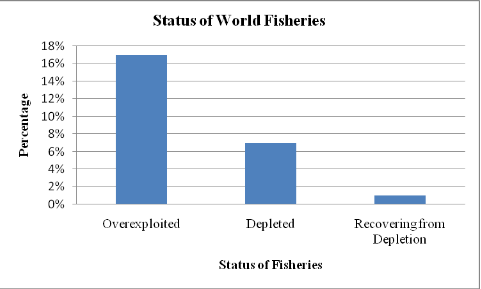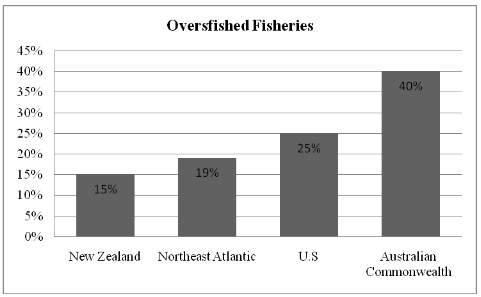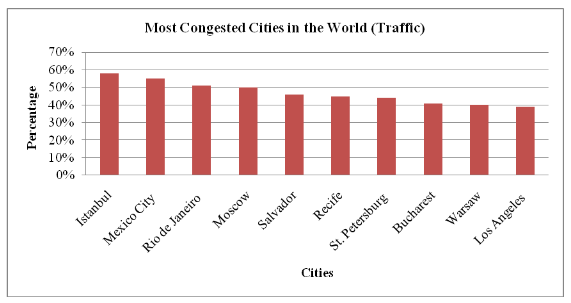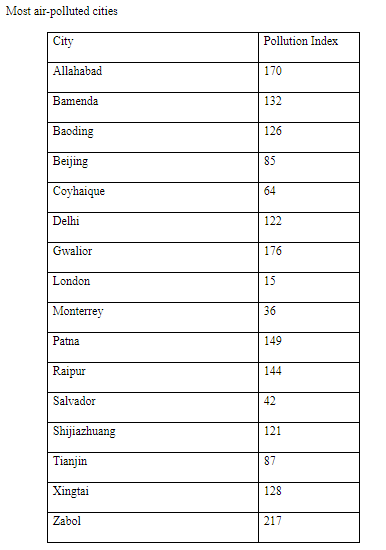A Tragedy of Commons
The world’s population has been growing on a daily basis. However, the size of our planet is not going to increase. Similarly, the available resources have not been expanding to pace up with the rate of population growth. It follows that the scarcity should be a daily phenomenon in the economy. Therefore, people should make critical choices on how to utilize the available scarce resources to satisfy their wants and needs. It is also expected that not all people’s wants and needs can be fully satisfied due to the limited nature of some resources. Nature has a limited amount of resources to all people, regardless of their financial status.
Therefore, economic sense is only attained by the presence of scarcity. Scarcity is a problem that everyone in the universe faces, and this is the basis of the study of economics. It should be noted that some resources are accessible to everyone. Appropriate examples of such goods and resources are fisheries, public freeways, and clean air, which are being used daily. Fisheries, public freeways, and clean air are categorized as the types of public resources and common pool, since they are all non-excludable. It should be noted that the problem with non-excludable resources, such as fisheries, public freeways, and clean air is that they are likely to cause a tragedy of commons situation eventually. This assertion emanates from the knowledge that the aforementioned resources are commonly tapped without regulation. In such cases, it is apparent that fisheries, public freeways, and clean air will be depleted by nature.
Currently, fisheries, public freeways, and clean air are in a critical situation, where they are most likely to become economically futile. With the growing population and increased competition, more parties are sticking their hands in the pool, and, in turn, it is speculated that public freeways will become too inefficient, fisheries will become dry, and clean air will get more and more polluted. Thus, the current situation of fisheries, public freeways, and clean air creates an economic puzzle, as their unlimited accessibility to everyone is against the principles of microeconomics. The puzzle of public goods may be beyond the basic understanding of microeconomic theory. The unrestrained nature of public resources and common pool resources is the main cause of a non-market phenomenon. However, microeconomic concepts can be applied to forge scarcity and limit the use of some resources. The current paper carries out a critical analysis of the current global situation of fisheries, clean air, and public freeways in relation to microeconomic theory.
Fisheries
Economic scholars stipulate that it is common for some commodities to be a good for one person and a bad for another person (Arnold 2). Such a commodity will be a good, as it is expected that it will give utility to some people, while it gives disutility. Economists have also indicated that goods are not only scarce, but resources, which are often limited, have to be used to produce them as they do not just appear (Arnold 2). However, fisheries are facing a global sustainability crisis because they are just goods to all people and they are readily accessible to anyone who is interested. The principle of economic scarcity is currently applicable in fisheries’ utilization. Fisheries management has failed, leading to this crisis because fishing fleets are characterized by overcapacity (Beddington, Agnew, and Clark 1713). There is a significant failure in enforcing the necessary reductions in the intense fishing efforts by communities. According to Garrity, about 29% of edible fish that can be found in salt-water have currently declined by 90% (64). Such a drop spells a grave situation in future because such fisheries are most likely to collapse completely.
There has been a decline in the status of fisheries. For instance, it has been indicated that 17% of the global fisheries are overexploited (Beddington, Agnew, and Clark 1713). Similarly, there is a 7% depletion of the world’s fish stocks. In addition, 1% of the world fisheries are currently recovering from depletion (see fig. 1). The report also indicates that the Northwest Atlantic, the Black Sea, the Northeast Atlantic, and the Mediterranean Sea have the largest number of depleted fish stocks. Therefore, the global state of fisheries is very poor. The situation has not reached a catastrophic state, but it is becoming so serious that it may become a crisis in the near future. There have been the rules of enhancing regulated fishing capacity. For instance, the Total Allowable Catch (TAC) has been used to limit the number of fish that can be caught by fishers. It is expected that a TAC-regulated fishery should lead to positive economic rents (Beddington, Agnew, and Clark 1713). However, the reality is different because normally, it is expected there will be unexpected increases in fish capacity, as more vessels keep entering the fisheries to benefit from the temporary positive rents (Beddington, Agnew, and Clark 1714). Consequently, fisheries are overfished.
Status of World’s Fisheries

Research has shown that some fisheries whose stock status is known are overfished. For instance, 15% of New Zealand fisheries are below the target reference for fishing. Other places where the fisheries have been overfished include Northeast Atlantic fisheries with 19% and U.S. fisheries with 25% (Beddington, Agnew, and Clark 1715). In addition, 40% of the Australian Commonwealth fisheries have been overfished (see fig. 2). Therefore, over-fishing is the principal problem that causes failure in the management of existing fisheries. There have been poor interpretations of ecosystem management, leading to critical conditions in the U.S. West Coast ground fish fishery. Moreover, weak stock management of fisheries has led to overfishing (Hilborn, Punt, and Orensanz). Most of the fisheries have been depleted.
Overfished Fisheries

Public Freeways
According to Arnold, economic literature identifies scarcity as the principal concept in economics. Scarcity is defined as the condition in which wants for goods and services exceed the limited resources that are available to satisfy those wants. Human nature leads to a situation where utility will be sought on a continuous basis, but nature limits the resources that may be used to produce sufficient goods and services to create economic usefulness. Thus, there is an all-time-existent situation where there are infinite wants for commodities and services, but the resources required to produce such goods and services are finite. In essence, scarcity is a necessity in economic theory (Arnold 2). Scarcity arises when infinite wants hit up against finite resources. Some economists have asserted that economics would not exist if there was no scarcity. The study of economics would be absolutely unnecessary if human wants would not be greater than the limited resources that are available to satisfy them. However, public freeways violate these prepositions. The reason for this is that public freeways are freely accessible to all those who may want to use them. There is no known cost that limits or restricts any individuals from a public freeway. Consequently, cases of congestion on the freeways, pollution, and damage on the freeways have been reported.
Currently, most transportation authorities have been barely managed to maintain the public freeways appropriately (Poole 3). Moreover, they have failed to increase the capacity of public freeways to reduce congestion. Despite the inability of government authorities to maintain public freeways, there is the continued utilization by citizens, subjecting them to further deterioration. Consequently, such public freeways will become inefficient in the near future. As motorists and other public freeways users engage in the unlimited utilization of such resources, wear and tear also increase due to the accumulated pressure on them. Consequently, the condition of most of the public freeways has become so bad that they no longer offer the efficient utility to users as they did before.
Book The Best Top Expert at our service
Your order will be assigned to the most experienced writer in the relevant discipline. The highly demanded expert, one of our top-10 writers with the highest rate among the customers.
In addition to wear and tear, congestion of numerous locomotives on public freeways significantly contributes to air pollution. It should be noted that most people have decided to purchase and use personal cars because they can freely use public freeways. Therefore, there are high chances that most of the vehicles operating on public freeways are those that carry only one passenger, the driver or the owner. However, emission of smoke from vehicles keeps increasing on a daily basis as the number of vehicles operating on the public freeways increases. A hypothetical example shows that there would be less air and other environmental pollutions if the use of public freeways would be limited. For instance, if people were restricted to use public transport by boarding vehicles that carry many passengers, significant savings could be made.
First, only few vehicles would be plying the public freeways, leading to less damages on the ways and more efficiency.
Secondly, the passengers would save the fuel costs that would have incurred if they were using private transport.
In addition, less fuel would be used and this could lead to sustainability of coal resources.
Third, the amount of emissions to the atmosphere would decrease significantly. Emissions containing carbon dioxide are known to contribute to global warming.
Therefore, environmental damages would decrease tremendously. However, none of the aforementioned suggestions has been executed. People still use their private vehicles and the damage is still significant, while the potential for a future crisis remains real. Thus, inefficiency on public freeways remains a critical problem.
Congestion on public freeways is a major problem that results in inefficiency. It should be noted that freeways are accessible to the general public at no cost. Several people would always want to use such freeways during the same time, as they are not restricted. Consequently, the freeways are always congested, leading to various inconveniences.
The persistent traffic congestion cases that have been reported in various parts of the worlds are the clear indications of inefficiency. For instance, statics indicate that Americans are stuck in traffic for 14.5 million hours each day, as they commute or transport goods to the market (Mailto and Morgan par 2). In addition, $23 billion is spent on vehicle repairs and other costs related to poorly maintained roads. Thus, out of the annual operating costs incurred by each motorist, about $126 emanate from congestion and poor quality of roads. The U.S. driving citizens’ population has grown twice as much as the country’s population growth rate, since 1970 (Mailto and Morgan par 5).
Traffic congestions lead to delays and wastage of fuel and time. For instance, traffic congestions are known to increase the driving time between places by more than 100%. In the United States of America, a trip that would take 20 minutes only on a public freeway that is free of congestion now takes almost 48 minutes during rush hour times when the roads are congested (Krol 3). Istanbul is the most congested city in terms of traffic (fig. 3). Congestion is costly. It also leads to wastage of time. For instance, in 2014, the U.S. has incurred costs of $160 billion (Krol 3). There have been approaches to increasing highway capacity, but these have not solved the problem fully because congestion returns as total traffic volume increases. An increase in total traffic volume is motivated by the free accessibility to highways. Thus, people feel that they should purchase and use personal cars for transport.
Most Congested Cities in the World (traffic)

Clean Air
Microeconomics recognizes scarcity as the problem of every person (Arnold 2). It does not spare the rich, as they have other wants that finances cannot satisfy. For instance, a rich person can satisfy most of his or her wants for tangible goods, such as cars, clothes, houses, and other luxuries, but he or she does not have sufficient resources to satisfy all of his or her wants. A rich person may want to spend more time with his or her family, have more friends, and prevent his or her family from threatening diseases. Unfortunately, it is impossible for one to have the sufficient resources to address all of the aforementioned issues to his or her satisfaction.
However, clean air is certainly available in the atmosphere for every creature on the universe to breathe. Free availability of clean air to all people is against the odds of scarcity in economics. It has been noted that the free use of atmosphere has contributed to its misuse. As stated by iMinds, the “Tragedy of the Commons” results from an overuse of publicly-owned resources when people take or use more of the commodity than they would if it was privately-owned. Therefore, independent actions that are taken by each individual lead to combined pressure on the resources, which exceed the capacity of the available resources. People have engaged in various activities that have led to air pollution that is available in the atmosphere for breathing.
The rampant cases of polluted air-related diseases are a clear indication of the deteriorating nature of clean air. For instance, more than 20 million residents of Delhi, India’s capital city, breathe polluted air (Riley par 2). The air in Delhi is considered the most polluted. Other towns, such as Beijing are renowned for poor quality of air (Riley par 2). Air has been polluted in these cities to a critical condition. It is also anticipated that the atmospheric condition of the cities will only become worse if mitigation strategies are not executed on time. Specifically, in China, air pollution is so bad that the government has initiated the war on air pollution in Beijing (“What Is China Doing to Tackle Its Air Pollution”). The cause of air pollution in Beijing is the smoke from cars and industries that are powered by coal, causing smog in the atmosphere, as the smoke has particles. Other cities whose air is polluted include Xingtai, Zabol, Gwalior, Coyhaique, and Bamenda. Air in cities like Monterrey, San Salvador, and London has not been extremely polluted (Vidal) (table 1).
Some of the elements that pollute the air include carbon dioxide, carbon monoxide, nitrogen dioxide, particulate matter, and sulphur dioxide (Skye). Such gasses contribute to the current problem of global warming, where there have been major climatic changes. There was a reduction of 11% in ground level ozone in the U.S. from 2000 to 2010 (Skye par 4). Consequently, the quality of atmosphere is decreasing due to pollution of air and pollution of clean air. However, there are countries that have maintained the quality of their air. According to Erbar, countries such as Luxembourg, Ireland, Sweden, New Zealand, Denmark, Estonia, Brunei Darussalam, Finland, Canada, and Iceland have the cleanest air in the world. These countries are safe to live in, as they guarantee good health.

Conclusion
It has been established that the free access to public resources or common pool resources leads to a tragedy of commons, where resources are misused and subjected to the treat of depletion. The reason for this is that most people are engaged in the extreme utilization of such resources because they are guaranteed of free access and use of commodities and services. Therefore, fisheries, clean air, and public freeways in the world have been subjected to depletion. However, microeconomic principles can be used to avoid the impending dangers on the aforementioned resources. It is anticipated that regulation on the use of these public resources will create scarcity, since people will have free access to them and use when needed. Thus, the introduction of regulations on the utilization of public resources can mitigate the current problems and prevent the imminent crisis by forging scarcity and limiting their misuse.
Recommendations
Some societal problems cannot be solved through technology. However, a collective change in morality and behavior can solve such difficulties. For instance, global warming is a common problem that our world is facing currently. It should be noted that there are advanced technologies that have been proposed to address the problem. However, if people do not change their behavior and shun deliberate pollution, global warming will persist. It is suggested that collective action should be taken to curb environmental pollution, especially air pollution. However, it is recommended that collective action should be taken to reduce the level of air pollution. Pollution quotas should be set for industries and individuals so that they can notice that air is limited.
The use of pollution quotas involves the restriction of companies and individuals on the amount of emissions they can discharge by administrative agencies. Alternatively, firms can be required to use specified manufacturing methods that will aid in emission reduction. Environmental governing agencies can also levy taxes on individuals and firms that dump pollutants on the environment. Emission taxes will be appropriate strategies that can be used to reduce or eliminate air pollution. Imposing a pollution cost will make the use of the atmosphere a costly activity. Therefore, the atmosphere and its clean air will become scarce resources whose utilization is limited. Forgery of scarcity is an appropriate microeconomic strategy that can resolve the problem of air pollution.
As for the case of fisheries, marine areas should be protected to limit access to public. Protected marine areas will become scarce to people. Thus, they will be treated as any other private goods, whose availability is limited. In addition, appropriate harvest strategies that limit the level of fishing should be introduced. The created limits on the levels of fishing that people should engage in will curb overexploitation as it will discourage people from mass fishing. Finally, varied time toll charges should be introduced to avoid overuse of public freeways during rush hours. Therefore, lower toll charges should be levied during off-peak hours while higher charges ought to be imposed during peak hours to discourage people from using highways during times that are known to have traffic congestions. Those driving themselves and carrying no luggage or other people should pay additional toll charges. Consequently, people will adopt a behavior of using public transport because private transport will be limited and costly. According to Hackett (50), there should be government intervention through rules and regulations to limit the use and harvest from common public resources. Therefore, it would be imperative to eliminate the limitless of nature of commonly or jointly owned resources by making them finite.